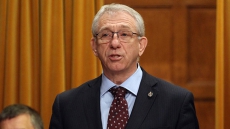OTTAWA - The Supreme Court of Canada hears an appeal this week delving into an issue that's increasingly resonating with Canadians as the country's population ages — the right to assisted suicide for the terminally ill.
On Wednesday, the country's highest court will begin hearing an appeal by the B.C. Civil Liberties Association that could ultimately result in dying but mentally competent Canadians being granted the right to receive medical assistance to hasten death.
It's the latest challenge to the Criminal Code of Canada's provisions outlawing assisted suicide. Its roots stretch back to the 1993 Supreme Court decision that denied Sue Rodriguez the right to die.
The B.C. woman, suffering from amyotrophic lateral sclerosis (ALS), sought to end her own life, famously asking: "Whose body is this? Who owns my life?"
In a 5-4 vote, the Supreme Court rejected her efforts to strike down the Criminal Code provisions, saying they weren't in step with Canadian values.
But times have apparently changed in the 20 years since Rodriguez's suicide in 1994 with the help of an anonymous doctor.
A recent poll from Dying With Dignity Canada suggests more than 90 per cent of respondents support the rights of the terminally ill to end their own lives, and believe they should be able to turn to their doctors to help them do so.
"We are cautiously optimistic that the Supreme Court will support assisted suicide this time out," Wanda Morris, head of Dying With Dignity, said in an interview. "Clearly this is an idea that has vast support across the country."
Lawyer Grace Patine, who will argue the case for the B.C. Civil Liberties Association, agrees.
"I think there's been a profound shift," she said.
"Virtually every Canadian has some experience, whether it's a family member or a friend or a loved one, of grappling with these very difficult end-of-life decisions. This is about how people want to be remembered, how they want to say good-bye, how they want to spend their final days. These are decisions that cannot and must not be made by government."
The latest appeal was launched in 2011 by the BCCLA and two women, Kay Carter and Gloria Taylor, both suffering terminal illnesses. Both women have since died. The 89-year-old Carter, however, had to travel to Switzerland to end her life.
In 2012, the B.C. Supreme Court ruled that the Criminal Code provisions against assisted suicide violate the rights of the terminally ill, and gave Parliament a year to rewrite the laws.
The federal government, however, appealed that ruling. The B.C. Court of Appeal upheld the ban on assisted suicide a year ago, saying it was bound by the Supreme Court of Canada's 20-year-old Rodriguez ruling.
The Supreme Court agreed earlier this year to hear the new challenge.
Justice Minister Peter MacKay, however, defended the status quo earlier this year.
"It is our government's position that the Criminal Code provisions prohibiting assisted suicide and euthanasia are in place to protect all persons, including those who are most vulnerable in our society," he said in a statement issued when the Supreme Court announced it would hear the appeal.
In addition to unsuccessfully directing Parliament to rewrite the country's assisted suicide laws, the B.C. Supreme Court also granted Taylor the right to an assisted suicide, making her the only Canadian to win that right. She died soon after, without the help of a doctor, from the degenerative neurological illness known as Lou Gehrig's disease.
Carter's plight was especially tragic. The elderly, pain-wracked woman travelled overseas — away from many of her friends and loved ones — to die in Switzerland, where physician-assisted suicide is legal.
Carter was confined to a wheelchair and in chronic pain due to spinal stenosis; her daughters, Lee and Marie, and one of her son-in-laws accompanied her to Zurich.
"Her family members have ever since then lived with the fear that they could be criminally prosecuted," Patine said.
"They are firmly of the view that people like Kay Carter who are suffering unbearably at the end of life should not have to travel to Switzerland to die. Lee to this day feels very badly that her mother had to die in a foreign country without all her family around and without the chance to say her final good-byes."
Assisted suicide is also legal in Belgium and the Netherlands.
In Canada, Quebec recently became the first jurisdiction to allow assisted suicide, although the legislation is being challenged in court.
Morris, of Dying With Dignity Canada, says she hopes Canada's highest court sets an example when it ultimately rules on the appeal next year.
"If we treated our pets the way we treat our loved ones at the end of life, we'd be thrown in jail," she said. "It's really time we gave our loved ones the right to die in peace and at a time of their choosing."




